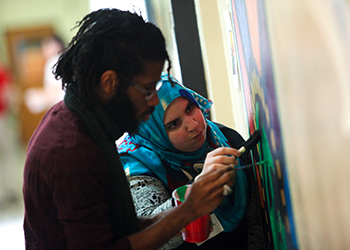Marquette’s initiative to become a Hispanic-Serving Institution
In spring of 2016, Marquette University announced that we would begin actively striving to become a Hispanic-Serving Institution (HSI). This federal designation requires an undergraduate population that is at least 25% Hispanic, with at least half of those students qualifying as low-income.
Five years later, Provost Ah Yun publicly reaffirmed our commitment to this effort. As he noted in his letter to the campus community, “This endeavor is about making Marquette a more welcoming and inclusive space for all our diverse stakeholders. HSI speaks to the very heart of our values as a Catholic, Jesuit institution: to serve the traditionally underserved, to provide care for each of our students and to strive for inclusive excellence.”
At a moment when demographic trends are shifting toward greater numbers of underrepresented minority (URM) students pursuing postsecondary education, we believe that the HSI initiative is more important now than ever. According to WICHE data, one in four public high school graduates in spring 2019 was Latinx. Working to recruit, retain, and graduate these and other URM students is a key part of Marquette’s adaptive strategy in these changing headwinds of higher education. Moreover, students from all diverse backgrounds contribute to a thriving campus community in incalculable ways, and investment in the HSI initiative positions Marquette as a stronger institution.
But really embracing an ethos of “servingness” requires more than a shift in the demographics of our student body; it also requires an equally dramatic response in campus practices. The vision of Marquette as a Hispanic-Serving Institution is one that includes strong ties to our local community, compositional diversity at all levels of the institution, a rich and rigorous educational experience that is accessible to students from all income levels and backgrounds, a commitment to the production of knowledge that advances social equity, a culturally-affirming campus climate where URM students and employees feel a sense of connection and belonging, and the infrastructure necessary to support all our stakeholders and help them thrive.
What follows are answers to some Frequently Asked Questions about this initiative. For more details, please contact Jacki Black, chair of the HSI Steering Committee, at jacqueline.black@marquette.edu.
What is “HSI”?
The term “Hispanic-Serving Institution” (HSI) is a federal designation defined by the Higher Education Act. It requires that institutions be 2- or 4-year accredited colleges, enroll a significant proportion of low-income students, and have 25% of their full-time undergraduate student body be Hispanic. Once an institution achieves HSI status, they are eligible to apply for federal Title V funds.
There are over 500 HSI-eligible institutions in the U.S., but very few in the Midwest. While they comprise only a small percentage of all institutions of higher education, HSIs enroll about 2/3 of all Hispanic undergraduates in the country.
HSIs are also extremely diverse. HSIs enroll not only the majority of Latinx undergraduates in the country but also significant numbers of other historically marginalized groups: based on data from the 2017-18 academic year, 22% of all African American students enrolled in postsecondary institutions attend HSIs, along with 29% of all Native Hawaiian/Pacific Islanders, 20% of all Native American, and 40% of all Asian American students.
*A note about terminology: “Hispanic” broadly refers to people of Spanish-speaking descent, while “Latino/a” (or the more gender-neutral term “Latinx”) refers to residents of the U.S. who trace their ancestry to Latin America. While many students prefer the term Latinx, in the Higher Education Act, which defines Hispanic-Serving Institutions, the term Hispanic is used. Moreover, the federal government uses the terms Hispanic and Latino interchangeably in the census. In the absence of consensus and in order to be inclusive in our terminology, we often use both terms.
Why is the HSI designation important to Marquette?
Serving underrepresented and low-income students is something that connects to the heart of Marquette’s mission as a Catholic, Jesuit institution. St. Ignatius, the founder of the Jesuits, described schools as a contribution to what he called the "common good" of society at large. In their ministries he wanted the Jesuits to minister to anybody in need, regardless of social status or socioeconomic class.
This work to better engage our community and support our historically marginalized stakeholders is a direct reflection of our Ignatian values: cura personalis, our apostolic call to walk with the excluded, and a preferential option for the most vulnerable among us. Marquette’s Guiding Values also call us to nurture an inclusive, diverse community.
What benefits come with becoming an HSI and diversifying our campus in other ways?
Diversity on campus makes us better and stronger. It allows us to be innovative and creative. The more ideas and perspectives we can bring to campus, the better poised we are to solve the complex problems of living in a globally interconnected society.
Additionally, employers seek employees who have intercultural and teamwork skills, global knowledge and experience with social responsibility. A 2015 study conducted by the Association for American Colleges and Universities reported that 78% of employers felt that college should learn intercultural skills, and 96% of employers thought college should prepare students to solve problems with people whose views are different from their own. Marquette students will be better prepared in these essential areas through our increased diversity.
Once we achieve this goal, Marquette will be eligible to apply for Title V federal funds. Although increased federal funding is not the reason we decided to pursue this goal, these funds foster the general development of the university and can be used for a wide range of things to benefit all students, including educational materials, improved facilities, faculty development, tutoring or counseling programs, and other student support services.
Why are we focusing on HSI now?
According to the latest data from the Western Interstate Commission on Higher Education, the overall number of high school graduates is expected to decline, but the share of those students who are students of color will increase, particularly those with Hispanic heritage. By spring 2019, one in four public high school graduates was Hispanic.
And this trend is no different here in our city. According to a 2016 report funded by the Greater Milwaukee Foundation, the growth in the Hispanic/ Latinx community is responsible for all of the growth in k-12 school enrollment in the area since the year 2000. And in the 2016-17 school year, Hispanic/ Latinx students already comprised 25% of all enrollment in k-12 Catholic schools in the Milwaukee Archdiocese, spanning 10 counties in southeast Wisconsin.
How far do we have to go?
When the university launched this initiative in the spring of 2016, our undergraduate student enrollment was 9.7% Hispanic/Latinx. We have seen tremendous growth in the years since, but we still have a ways to go to increase our overall undergraduate Hispanic/Latinx enrollment to 25%. You can find our most current demographic data on the composition dashboard and also see a snapshot of our progress here.
Do Marquette’s efforts to recruit Hispanic students come at the expense of recruiting students from other backgrounds?
No. Marquette is equally committed to recruiting students from all backgrounds, and has also stated a goal of increasing Black and Native American student enrollment and retention. We hope that some of the recruitment and retention strategies we employ for Hispanic/Latinx students will help us yield and support more students from other underrepresented groups as well.
Learn more about our efforts to "raise all voices" through this HSI webinar recorded in December 2020.
Does the university have, or is it considering, quotas for minority students?
No. A “quota” denotes either minimums or limits on the number of students who have a particular racial or ethnic background. Marquette has never embraced this practice nor are we considering it now.
While the university is increasing its efforts to recruit students from diverse backgrounds, any student who applies to Marquette is subject to equal acceptance standards. And while the university does have specific goals related to recruiting students from diverse backgrounds, it also has a goal of increasing its overall enrollment. We want to make it possible for any qualified student to attend Marquette.
How will Marquette achieve this goal of becoming an HSI?
In 2016-17, an HSI Steering Committee convened to explore current practices and determine needs in a variety of areas, including but not limited to: community outreach, pre-college programs, recruitment and transfer support, retention and support services, campus climate, curricular offerings, hiring practices, financial assistance, and alumni engagement. Based on the committee’s findings, the university has made shifts in institutional practices, increased staffing in key areas, and enhanced programming. Here is a snapshot of our goals:
- Enhance our outreach to the Hispanic/Latinx community here in Milwaukee.
- Increase our capacity for Spanish language outreach.
- Increase our enrollment of Hispanic/Latinx students to 25% of the undergraduate student body, increase the number of other underrepresented undergraduate and graduate students, and better support transfer students.
- Increase tuition assistance and raise money for additional staff and programming through intentional fundraising efforts.
- Provide better direct support to underrepresented populations and increase opportunities for Hispanic/Latinx student engagement and leadership.
- Work towards greater diversity in our curricula and our faculty.
- Create greater awareness of issues related to diversity, inclusion, equity, bias, and microaggressions among administrators, faculty, and staff.
- Better engage with Hispanic/Latinx alumni.
See our progress here!
The HSI Network of Wisconsin

Marquette University is a founding member of the HSI Network of Wisconsin (HSI-NOW), which is a coalition of leaders from higher educational institutions in southeast Wisconsin that have obtained or are working toward the federal designation of Hispanic-Serving Institution (HSI) and are committed to attracting, supporting, retaining, and graduating underrepresented students. HSI-NOW member institutions share information and best practices, seek out collaborative opportunities to address challenges, and engage with and serve as a resource for the broader community. By tapping into the unique strengths of each institution and creating an infrastructure of mutual support, HSI-NOW collectively builds capacity to graduate an increasing number of underrepresented students in the region and to truly serve all of our diverse community stakeholders.
View HSI-NOW's Framework for Servingness, developed in 2024 to help campuses evaluate their structures, practices, and policies for greater inclusivity and equity for Latinx and other underrepresented students.
For more information on this initiative, please contact:
Jacki Black
Director for Hispanic Initiatives and Diversity & Inclusion Educational Programming
414-288-4118
jacqueline.black@marquette.edu
 Find resources for undocumented students from the Office of Institutional Diversity and Inclusion at Marquette.
Find resources for undocumented students from the Office of Institutional Diversity and Inclusion at Marquette.
